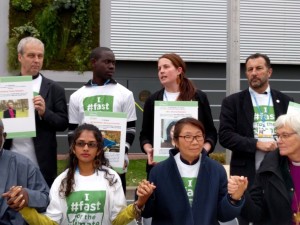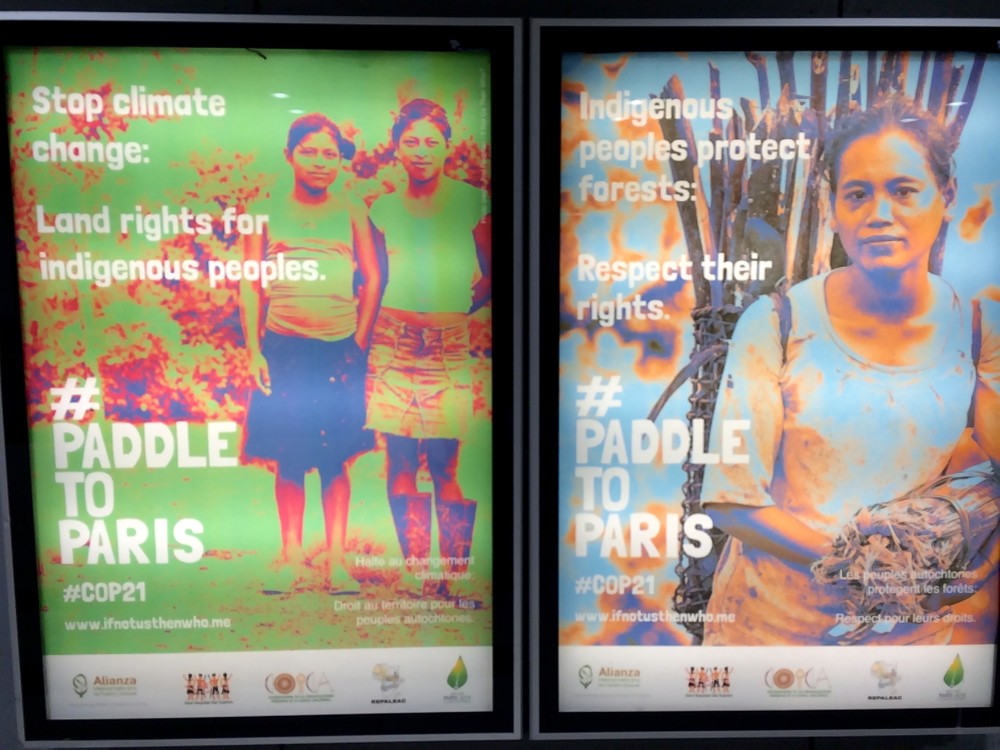
From COP21 – The Local and the Global
Paris is a long way from the places that I call home. Trying to schedule phone calls with my partner and kids back home, with a 9-hour time difference, has served as a regular reminder of this.
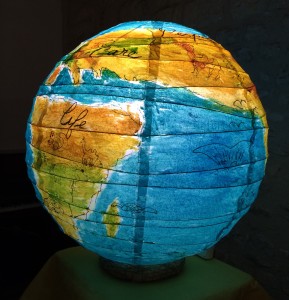 And increasingly, over the past few years, my climate work has felt localized. Systemic, absolutely. Intersectional, sure. But rooted in the places and the people that I call home.
And increasingly, over the past few years, my climate work has felt localized. Systemic, absolutely. Intersectional, sure. But rooted in the places and the people that I call home.
During graduate school, one of my favourite theologians was a Brazilian Catholic nun named Ivone Gebara. An eco-feminist and liberation theologian, Gebara lit fires and connected dots for me.
In her book, Longing for Running Water, Gebara talks about God as relatedness, and she talks about relatedness as a human and earthly condition. She says,
“My initial relationship with the earth is not with Earth as a planet that is part of the solar system, but with the earth on which I took my first steps; on which, in time, I took firmer steps; and on which I jumped, rolled, and shed tears. My initial relatedness with the earth is with the soil upon which I was born and through which all my other relationships have been mediated.”
Before this trip I spent a lot of time considering what value my localized climate work had at a global meeting like the COP. Here where we’re talking about:
- Long-term climate reduction targets (Canada needs to get back on track to meet our 2020 targets, and make ambitious but achievable plans to decarbonizes by 2050)
- Mechanisms to limit global warming levels (nearly all countries have committed to a max 2-degree increase, but the combined plans that they have submitted amount to a 2.7-degree increase, and the reality is that anything over 1.5 degrees is fatal for large, climate-vulnerable regions)
- Billions of dollars to support mitigation and adaptation efforts globally (the additional call from impacted regions is for increased funds for ‘loss and damages’ for the climate impacts that they, with their low carbon footprint, didn’t cause but are feeling most)
- Legally binding commitments, 5-year commitment periods, adequate assessment, and a progression clause to ensure commitments scale up over time.
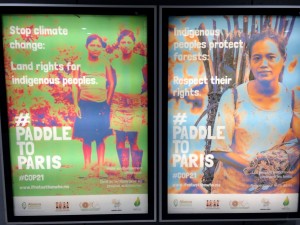 None of this is familiar language to me. It feels worlds away, not just 9 hours away, from the earth on which I took my first steps. World away from, but related to, our fights at home to block risky pipelines on Indigenous lands, and reduce tanker traffic on pristine coast, and prevent massive investment in infrastructure projects that lock us into the old economy, and make clear that fracking natural gas is not a climate solution.
None of this is familiar language to me. It feels worlds away, not just 9 hours away, from the earth on which I took my first steps. World away from, but related to, our fights at home to block risky pipelines on Indigenous lands, and reduce tanker traffic on pristine coast, and prevent massive investment in infrastructure projects that lock us into the old economy, and make clear that fracking natural gas is not a climate solution.
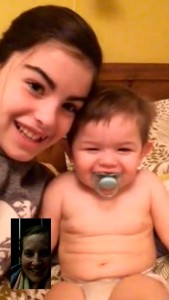 At a Monday panel on faith-based engagement on the climate crisis, Fazlun Khalid, from the Islamic Foundation for Ecology and Environmental Sciences (IFEES), spoke about how the world’s water supplies are limited and constantly recirculating. And he said for him the poignant realization out of that reality is that you and I have probably drank the same water, swam in the same water, bathed in the same water.
At a Monday panel on faith-based engagement on the climate crisis, Fazlun Khalid, from the Islamic Foundation for Ecology and Environmental Sciences (IFEES), spoke about how the world’s water supplies are limited and constantly recirculating. And he said for him the poignant realization out of that reality is that you and I have probably drank the same water, swam in the same water, bathed in the same water.
I am in Paris to protect my beloved Pacific Coast, and to amplify the voices of the Indigenous people whose land I call home, to defend the future for my children. And I am in Paris to protect your coasts, to listen to the voices of impacted communities everywhere, to defend the future for your children too.
If I am homesick, it is amplified by the depth of love that activists and advocates here have for their own homes, their own earth and soil. It is a reminder of why this, and all of our climate justice work, matters.
Christine Boyle is one of the United Church of Canada’s delegates to COP21. She is the Director of Spirited Social Change, and a co-founder of Fossil Free Faith. She is based on unceded Coast Salish Territory. You can follow her COP21 tweets @christineeboyle or see pictures here.
